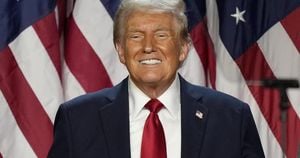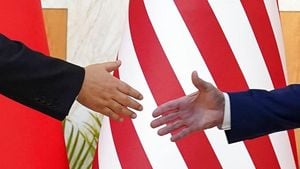Donald Trump’s recent appointment of Elise Stefanik as the new U.S. Ambassador to the United Nations is raising eyebrows and offering new insights about America’s future engagement with international diplomacy. Stefanik, who is widely recognized as one of Trump’s staunchest allies, has had her fair share of ups and downs within the political arena. But as she prepares to step onto the global stage, analysts are sifting through what her nomination means for both the U.N. and U.S. foreign policy.
Elise Stefanik is no stranger to the political spotlight. Elected to Congress at just 30 years old, she made history as the youngest woman ever to occupy such a position, and quickly garnered attention for her articulate representation of Republican ideals. Originally, she championed moderate stances within the GOP and even expressed criticism of Trump during the early days of his campaign. Fast forward to today, and she’s transformed her image, standing firmly alongside Trump, and even reportedly being considered for his potential running mate for the 2024 election.
This evolution has many commentators questioning what her presence at the U.N. could signify. Trump himself has praised Stefanik's capabilities, noting, “Elise is an incredibly strong, tough, and smart America First fighter.” This strong endorsement sets the stage for her confirmation process, which will require approval from the Senate.
Despite having established herself as one of Trump’s key allies, Stefanik's recent statements on international issues, particularly concerning Ukraine, reveal the complex, often contradictory, nature of her political alignment. Once, she had strongly advocated for Ukraine's membership in NATO, casting it as imperative for European stability amid Russian threats. Her past remarks indicated support for military assistance to Ukraine and aligned with bipartisan efforts during the onset of the Russo-Ukrainian war.
But lightning can strike swiftly in politics, and now she seems to be toeing the line with Trump’s more isolationistic approach. When pressed about her stance on Ukraine joining NATO, her office offered no definitive answer, instead emphasizing her commitment to Trump’s broader “peace through strength” strategy.
This shift mirrors the growing skepticism voiced by many Republicans about the U.S. involvement and aid to Ukraine. Several members of the party, including Trump, have taken to questioning the value of military and financial support, which complicates the narrative around U.S. foreign aid. Stefanik’s pivot suggests she’s willing to adapt to this shifting political climate.
Meanwhile, analysts point out the potential impact of Stefanik's nomination on U.N.-U.S. relations. Critics argue her ties to Trump could amplify tensions between the U.N. and the U.S., especially considering Trump's previous confrontational stances during his first administration. Yet, there are those who believe her close relationship with Trump might actually stabilize U.S.-U.N. relations, particularly as she understands the nuances of international diplomacy and the importance of constructive engagement.
For example, during Trump’s first term, his administration did engage the UN effectively at times, securing sanctions against North Korea and Iran alongside delivering humanitarian aid funding. Such pragmatic moves could resurface with Stefanik at the helm. Analysts argue her positioning might alleviate fears of Trump reverting to isolationist policies, offering some relief to the international community observing the U.S. shift under his leadership.
Stefanik's history as one of the primary voices for the House Republican Conference also adds weight to her upcoming appointment. Her experience may grant her significant clout when it pertains to funding decisions for the U.N. Since the U.S. is one of the largest funders of U.N. operations, her role could leverage considerable influence over appropriations in Congress, especially with her connections allowing her to navigate disparate views within the party more effectively.
Political analysts speculate how the inter-chamber dynamics of Congress with a Republican-controlled Senate and House might affect U.N. funding moving forward. With both chambers potentially at odds over the U.N. budget and various legislation surrounding it, Stefanik may help create pathways for financial support against more radical efforts to defund international bodies.
Stefanik’s political biography demonstrates her ability to adapt her stances to current demands efficiently—a skill all too necessary for maintaining her political stature as both partisan divides grow and the global environment fluctuates. By aligning herself closely with Trump, she is likely to bolster her own position, increasing her prominence as other cabinet-level appointments filter through.
With the specter of congressional dissent looming, particularly from hardliners who might champion isolationism, Stefanik’s role becomes even more significant. Her leadership might serve as a counterbalance, especially when attempting to negotiate bipartisan support to maintain America’s long-standing commitments to the U.N.
What remains to be seen is how effectively she can bridge these factions during her residency at the U.N. Analysts remain cautiously optimistic, hoping her leadership will blend Trump’s confrontational electric style with the need for engaged diplomacy, particularly as the world’s crises mount, and the effects of climate change compound global pressures.
Observers will keep their ears open for any signs of moderation or indicative changes noteworthy of her early days as she embarks on this pivotal role. Stefanik presents as one strategic appointment amid unprecedented global uncertainties. Her ability to navigate internal party dynamics and U.S. foreign policy may just forge new pathways across the diplomatic table, shaping international relations under old and new pressures.



